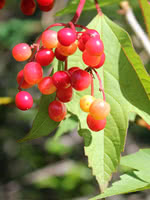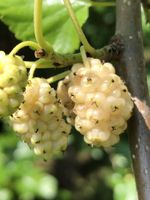Mon-Fri 9am - 5pm Mountain time
Highbush Cranberry vs Russian White Mulberry
Viburnum opulus var. americanum (trilobum)
Morus alba tatarica
SOLD OUT
NOT AVAILABLE THIS SEASON - MIGHT RETURN
Highbush Cranberry produces attractive white flowers in late June and bears edible fruit that matures to a bright red colour in the late summer.
This shrub, native to much of Canada, is fast growing, and its fruit can be eaten raw or cooked into a sauce.
Russian White Mulberry is a cold hardy and adaptable tree. It is a great choice for the impatient gardener as it reaches its mature height in a short period of time and has an attractive, dense, and rounded form.
Odd looking berries are produced among a backdrop of glossy, deep green foliage. The blackberry-esque berries ripen slowly over the season, ranging in color from white, pink, and purple-violet. While the berries are not well regarded for fresh eating, they have made tasty jams and preserves.
Highbush Cranberry Quick Facts
Russian White Mulberry Quick Facts
In row spacing: 0.6 m (2.0 ft)

